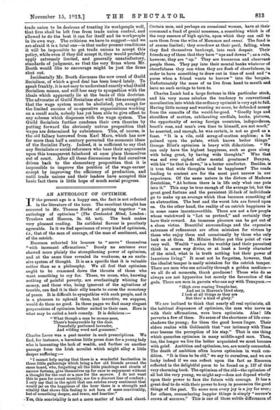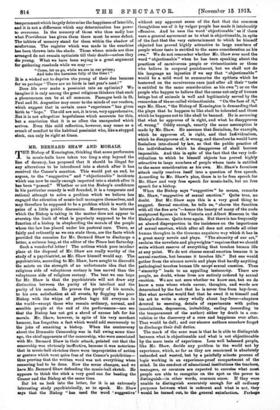AN ANTHOLOGY OF OPTIMISM.
TF the present age is a happy one, the fact is not reflected in the literature of the hour. The excellent thought has
occurred to Mr. Thomas Burke of putting together "an anthology of optimism " (The Contented Mind, London : Truslove and Hanson, 3s. 6d. net). The book makes very pleasant reading. Its antidotal flavour is peculiarly agreeable. In it we find specimens of every kind of optimism, i.e., that of the man of courage, of the man of sentiment, and
of the ostrich.
Emerson exhorted his hearers to " nerve" themselves "with incessant affirmations." Surely no sentence ever showed more plainly the strengthening power of optimism, and at the same time revealed its weakness, as an exclu- sive system of thought. It is as a specific that it is valuable rather than as a philosophy. We all feel that optimism ought to be crammed down the throats of those who want something to cry for. Those, we mean, who, knowing nothing of painful poverty, are everlastingly whining for .money, and those who, being ignorant of the agitations of trouble, can find it in their silly hearts to curse the monotony of peace. It is difficult to sympathize with such people, and it is a pleasure to upbraid them, but invective, we suppose, would do them no good. In these pages we find many elegant preparations of optimism better suited to their case. Here is what may be called a herb remedy. It is delicious :— " What though a man be money-poor, There's honeysuckle by the door.
Peacefully perfumed lavender, And wilding weed and gossamer."
Charles Lever was a past master in such prescriptions. We find, for instance, a harmless little prose dose for a young lady who is lamenting the lack of wealth, and further on another passage from the Irish novelist which might allay a little deeper suffering :—
" I cannot help saying that there is a wonderful fascination in those little gatherings which bring a few old friends around the same board, who, forgetting all the little pinchings and straits of narrow fortune, give themselves up for once to enjoyment without a thought for the cost or a care for the morrow. I do not want this to pass for sound morality, nor for a discreet line of conduct ; I only say that in the spirit that can subdue every sentiment that would jar on the happiness of the hour there is a strength and vitality that shows this feeling is not born of mere conviviality, but of something deeper, and truer, and heartier."
'Yes, this conviviality is not a mere matter of talk and claret.
Certain men, and perhaps an occasional woman, have at their
command a fund of genial nonsense, a something which is of the very essence of high spirits, upon which they can call to save them from the wiles of Mammon and ennui. The fund is of course limited ; they overdraw at their peril, falling, when they find themselves bankrupt, into rank despair. Their
friends say of them that they have " ups and downs " ; as a rule, however, they are "up." They are humorous and observant people these. They pay into their mental banks whatever of cheerfulness they can when they are flush of cheerfulness, in order to have something to draw out in time of need and "a purse when a friend wants to borrow " into the bargain.
Unfortunately the mass of us live from hand to mouth and have no such savings to turn to.
Charles Lamb bad a large fortune in this particular stock, and his very name rebukes the tendency to conventional moralisation into which the ordinary optimist is very apt to fall. Having little money and wanting no more, he defended money from the assaults of the would-be-good. " Goodly legs and shoulders of mutton, exhilarating cordials, books, pictures, the opportunity of seeing foreign countries, independence, heart's ease, and man's own time to himself, are not muck,"
he asserted, and enough, he was certain, is not so good as a feast. " It is a vile, cold scrag-of-mutton sophism ; a lie palmed upon the palate, which knows better things." George Eliot's optimism is heavy with didacticism. " We can only have the highest happiness, such as goes along with being great, by having wide thoughts." Who that was sad ever sighed after mental greatness P Bunyan, with his " he that is down," is a better comforter. Besides, is
it true that wide thoughts tend to happiness ? The roads leading to content are for the most part narrow in our experience. Of the same nature is the dictum of Madame Swetchine, " At bottom there is in life only what one puts
into it." This may be true enough of the average lot, but the great good fortune and the persistent ill-luck of individuals go to make up an average which thus becomes something of an abstraction. The best and the worst lots are forced upon us. On the other hand, the reality of an ostrich happiness is in some cases incontrovertible. There are not a few people whose watchword is "Let us pretend," and certainly they have their reward. An immense pleasure can be got out of a sham virtue. Beautiful surroundings and the expensive
extremes of refinement are often mistaken for virtues by those who enjoy them and occasionally by those who only look on at them. Mr. Hilaire Belloc put this point of view very well. Wealth " makes the wealthy (and their parasites) think in some way divine, or at least a lovely character of the mind, what is in truth nothing but their power of luxurious living." It must not be forgotten, however, that
the idealist temper is easily mistaken for the ostrich temper. There are men who see actuality through a golden medium—. we all do at moments, thank goodness ! Those who do so always are not hypocrites but merely the favourites of the
gods. There are men in garrets who can say with Tennyson
"High over roaring Temple-bar, And set in Heaven's third story, I look at all things as they are
But thro' a kind of glory."
We are inclined to think that nearly all real optimists, all the habitual dispensers of optimism, the men who nerve us with their affirmations, were born optimists. Alas ! life perverts a few of them. No sense of the shortness of life over-
shadows the young; for them the good hours linger. Their elders realize with Goldsmith that "our intimacy with Time ever lessens the perception of his stay." That is one thing which quenches optimism in many middle-aged men. Then, too, the longer we live the better acquainted we must become with grief. Ambition and optimism, too, are nearly connected.
The death of ambition often leaves optimism in weak con- dition. "It is time to be old," we say to ourselves, and we are lucky indeed if we can reflect upon the fact as Emerson reflected in the delightful poem to be found on p. 137 of this very charming book. The optimism of the old—the optimism of
all but the very young, we might say—does not depend wholly upon their power to face the future with courage. It has a great deal to do with their power to keep in possession the good things of the past. To seine men every joy is a joy for ever; for others, remembering happier things is simply "sorrow's crown of sorrows." This is one of those subtle differences of temperament which largely determine the happiness of later life, and it is not a difference which any determination has power to overcome. In the memory of those who thus sadly lose what Providence has given them there must be some defect. The tablets of memory stand for them within the shadow of misfortune. The register which was made in the sunshine has been thrown into the shade. Those whose minds are thus arranged do not remain optimists till their death—unless they die young. What we have been saying is a great argument for gathering rosebuds while we may :-
" Come, let us go, while we are in our prime; And take the harmless folly of the time
It is a wicked act to deprive the young of their due because for us perhaps " There are no birds in last, year's nest ! "
Does life ever make a pessimist into an optimist? We imagine it is only among the great religious thinkers that such a phenomenon can be at all common. Passages both in St. Paul and St. Augustine may occur to the minds of our readers, which suggest that in certain cases `experience" has given birth to " hope." The old are not, it is true, very apprehensive, But it is not altogether hopefulness which accounts for this, but a conviction that it is so often the unexpected which arrives. Even this mild reflection, however, may come as a crumb of comfort to the habitual pessimist who, like a stopped sleek, can only be right at times.































































 Previous page
Previous page